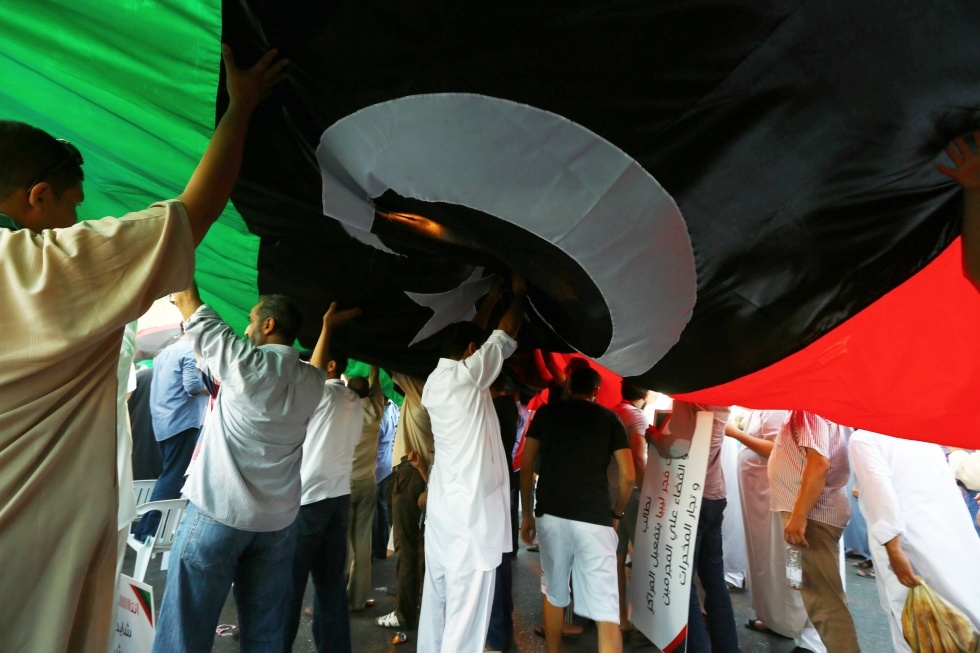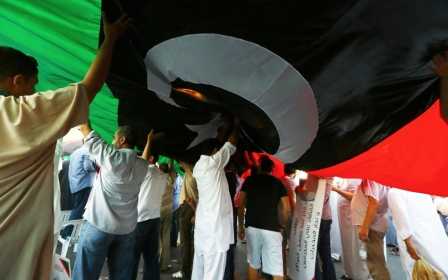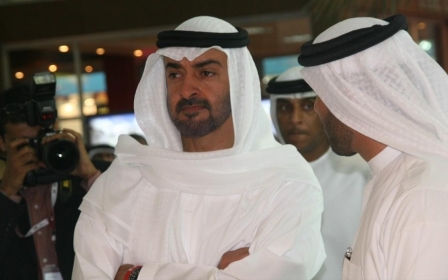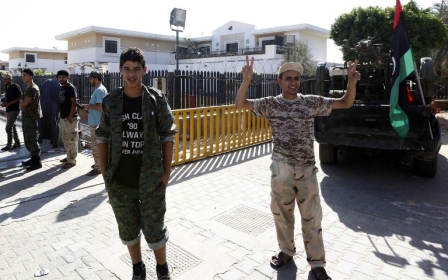
Foreign actors and the Libyan civil war
The Arab Spring, which broke out in early 2011, faced a regional order that emerged after the Desert Storm Operation. The order was based on an alliance between the West and Arab dictators, whereby the former provided technical and political legitimacy and the latter focused their policies on curtailing the growing influence of Islamism. The massive and peaceful nature of the Arab Spring confused the political calculus of this alliance.
However, after the rapid and unexpected collapse of the Tunisia's leader Zine al-Abidine Ben Ali, the West and its more stable Arab allies became open to the idea of sacrificing embattled leaders in order to maintain a policy of preventing democratic transformation, which to the West equates the rise of Islamists to power. To be consistent with its proclaimed advocacy of democracy, the West wanted to be seen not simply as supportive, but protective as well, of the mass movement. Libya, given its history and location (both a “rogue” state, but distant enough from Israel as to allay the fear of conflict spillover), provided a convenient target to give that impression. But the original contradiction between the public image of supporting the popular aspirations and the vested interest of the traditional alliance to stifle them would emerge soon after the collapse of Libyan leader Muammar Gaddafi.
While the Egyptian military - enjoying the backing of regional players - was able to reset the map to pre-revolution status, and while economic pressures forced the Islamists of Tunisia to temporarily retreat from the political scene, the Libyan intervention has created a complicated scene where no one actor is solely capable of shaping the outcome of the revolution. Although the revolutionaries failed to unite, and although Libyan Islamists didn’t enjoy as wide popular support as their counterparts in Egypt, the strength of their militias and their ability to use the language of revolution to their advantage presents a problem for the traditional Arab regimes and their Western allies.
The most recent fighting is the culmination of a long term effort to resolve the problem. Like it did in the one-year-long planning to undermine the Muslim Brotherhood in Egypt, the UAE again led a new effort in Libya. But in Libya, it had weaker allies, more potent adversaries, and a hesitant superpower. The outcome is a half-revolution and a half-coup.
Alliance of convenience
During his forty years of rule, the late Libyan President Muammar Gaddafi - the Sunni leader who dreamed of reviving medieval Shiite rule, the Arab nationalist with the habit of castigating his Arab counterparts, the author of the third world “theory,” and the king of African kings who funded coups for leisure - created many local and foreign enemies. When unrest broke out in Libya in February 2011, there were many parties happy to see Gaddafi go, or at least pay for the wrongs they perceive he had committed. Domestically, there was an array of hostile political actors. Some of these were from the Libyan Fighting Group, some from the Muslim Brotherhood, while others belonged to a mosaic of secular personalities living abroad.
Internationally, his rapprochement with the West after surrendering his weapons of mass destruction program and agreeing to compensate the victims of the Lockerbie bombing failed to undo years of distrust and conflict. However, one Western country - France - had more than just old scores to settle with Gaddafi. Gaddafi’s rising influence during the decade preceding the revolution across the African continent, and especially his willingness to bankroll regimes in West Africa, had placed France’s economic and cultural influence at risk.
In the Arab world, the traditional Gulf monarchies never liked Gaddafi or his policies, be it his support of Iran during the Iran-Iraq war or the war of Iraq after its invasion of Kuwait. The latent hostility between the “revolutionary” leader and “reactionary” Arab monarchs worsened when a “plot” to kill Prince Abdullah (now king) of Saudi Arabia was uncovered in 2004. Libya was immediately blamed. This strained relations between Libya and three countries in the Gulf Cooperation Council: Saudi Arabia, Kuwait and Bahrain.
The policies of another member of the GCC, Qatar, especially its ties to the Muslim Brotherhood, put it on a collision course with Gaddafi. Its attempts to maintain cordial relations with Libya never went too far. The best moment for the two countries’ relations was when a détente between Gaddafi and the jihadists was reached, thanks to the effort of a few Muslim Brotherhood clerics based in Qatar. But that effort was soon spoiled when Gaddafi publically mocked the Qatari emir during an Arab League summit in Sirte in the same year. Doing equal damage to the relations was Gaddafi’s policy of not allowing the Muslim Brotherhood to have any political presence in his country.
UAE forsakes a partner
The UAE was the Gulf exception. Its relationship with Gaddafi’s regime was better. The ruling families in the two countries had ties, going back to early 1970s. Gaddafi and his family visited UAE on several occasions and the rulers of the Emirates, the al-Nahyan, reciprocated. In the later years of the colonel’s reign, his son, Saif al-Islam, nurtured closer business ties with the Emirati foreign minister, Muhammad bin Zayid. The rise of Dubai as a major business centre and a mecca for Arab money-laundering helped further cement these ties. Most of Gaddafi’s troubled youngsters, including Saif, became regular visitors to the town.
Beyond business, the countries shared a strong aversion to the Muslim Brotherhood.
Up until the start of the revolution in Libya, state media in both countries continued to speak of good brotherly relations. This would publically change in the last week of March 2011, when the UAE declared that it would send 12 jetfighters to help impose UN resolution 1973. This was not a principled change of heart on the part of the UAE, but an attempt to join an already forming coalition to topple Gaddafi.
By this time, its neighbour, Qatar was already advocating, along with France, military action against the general’s rule. Between mid-February and late March, Arab cyber-space was abuzz with rumours that the UAE was one of two Arab countries (the other being Algeria), helping Gaddafi transport mercenaries from different locations in Africa to Libya in order to put down the revolt. Although the Emiratis never admitted to this, its good relations with Gaddafi at the time and its fear of the movement of change sweeping the Arab world strongly suggest that these rumours may have some substance.
Conflicted agendas
In the game of interests, the position of the UAE vis-à-vis Libya in the years preceding the Arab Spring is more akin to that of the US. America’s and the UAE’s positions are different from the positions of France and Qatar. Like the US, UAE has no ideological constraints biasing its stance from the regime of the colonel. The Emirati elite had no love for the Muslim Brotherhood or any other opposition force in the Arab world, and the rapprochement between Libya and the West created significant opportunities for business and tourism. The US had also had a significant trade with Libya in the years before the war. For much of the period between 2007 and 2011, the volume of US exports to, and imports from Libya remained significantly higher than any previous period. The rise of US imports during this period in particular reflects the level of normalisation in relations.
In contrast, France and Qatar had little at stake in the Gaddafi's Libya. They believed that their interests would be better served by his departure. Although all the four nations ended up playing a role in toppling Gaddafi, this divergence in perception influenced their behaviour in the lead-up to the intervention. Admittedly, France and Qatar were in a hurry to strike Gaddafi, and France eventually led the aerial campaign, precipitating the American intervention.
The conduct of the allies in the lead-up to the conflict shaped their behaviour after the war. While France was more interested in seeing Gaddafi go, leaning toward Mustafa Abd al-Jalil, a figure of national consensus and a pious lawyer with an Islamist slant, the Americans and the Emiratis favoured Mahmoud Jibril. Mahmoud Jibril was educated in the US and had subsequently contributed to the deepening of economic ties between the US and Gaddafi in the years preceding the war. The former US ambassador to Libya, Gene Cretz, described him as “a serious interlocutor who ‘gets’ the US perspective.” It is that business focus and lack of Islamist leaning that made Mahmoud Jibril a favourable ally to the Emiratis as well.
Allies become rivals
In addition to the complex maze of tribal and ideological interests, the foreign powers competed with one another to promote their local allies in the post-Gaddafi Libya. While the US and France preferred to work behind the scenes, focusing more on the potential of business deals, their two Arab allies, Qatar and UAE, were deeply involved in the political process. For most ordinary Libyans, the rivalry between the two Gulf States was too obvious.
Differences that were overlooked in interest of unity to topple Gaddafi surfaced after the National Transitional Council took over. Progressively, three main centres of power emerged. One party was the Muslim Brotherhood and moderate jihadists who had allied with them during or immediately after the conflict. This bloc received support primarily from Qatar, and to a lesser extent, from Turkey. The second group was a loose alliance of secular or otherwise unaffiliated professionals supported by the US, the UAE, and to a lesser degree, France. This bloc relied on its popularity with contacts of many senior and mid-level figures from the former regime. The third bloc was that of Ansar al-Shari‘a, an independent Salafi jihadist group.
Ansar al-Shari‘a boycotted the electoral process in its entirety, although some accused it of lending support to the other Islamists. Publically, Ansar al-Shari‘a advocates an Islamist system of governance. Although mostly composed of militiamen, Ansar al-Shari‘a has an active civilian arm engaged in preaching and charitable work.
The asymmetry in political leverage and military means between the various groups would shape the conflict over power in Libya. On a the military level, the loose alliance of former jihadists and the youth ideologically akin to the Muslim Brotherhood appeared to possess the largest and the best trained militia. This allowed it to control strategic areas during the 2011 conflict. The group however, lacked political infrastructure and a matching support base. Unlike their counterparts in Egypt and Tunisia, the Muslim Brotherhood of Libya failed to overcome the restrictions placed by Gaddafi on their movement.
The second camp, often described as secularists, although it has many pious Muslims, had the opposite problem. While it was politically strengthened by its alliance with members from the former bureaucracy, granting it the potential to forge alliances with tribal leaders and hence the ability to sway voters, it was backed by poorly-trained and far less cohesive militias.
With the jihadists boycotting the electoral system, the remaining rivals focused during the period between the fall of Gaddafi and the most recent election on depriving the other player of its strongest asset. The secularists, backed by an extensive media network within and outside Libya, pushed for a quick disarmament of the militias on the pretext that they are spreading terror and undermining the sovereignty of the state. For their part, the Muslim Brotherhood and their allies pressed ahead to institute laws precluding anyone with ties to the former regime from participating in the electoral process, citing the need to protect the revolution against a backlash.
From political manoeuvrings to armed conflict
While much of the jockeying for power remained largely peaceful and hidden, the Islamists’ ability to gain a majority in the General National Congress (GNC) allowed them to pass a strict, 19-article law that bars most former bureaucrats from running for office or holding any key position in the Libyan government. The law banned any political figure who “had played an administrative, political, military, intelligence, media or academic role in the range of organizations that supported the former regime” from being appointed in any key administrative post and from running for office.
The timing of the law was significant, especially for the Islamists. When the draft was signed into law by the GNC in early May 2013, the Islamists of Libya were trying to avert the conundrums that their counterparts in Egypt and Tunisia faced. Islamist movements in both countries appeared unable to consolidate their hold on power despite their significant electoral gains.
Whether it was genuinely meant to prevent the infiltration of the old regime into the new system or was calibrated specifically for partisan interests, the passage of the law - which was criticised by the United Nation as being too harsh - marked the beginning of the descent into military conflict. Not only did the rhetoric heat up, but the capital would also witness high profile assaults from armed groups against political figures from both sides.
In this context and with the plight of Egypt’s Islamists fresh in their minds, the Islamists created a joint-command for the militias loyal to them. The force - known as the Libyan Revolutionaries Operation Room (LROR) - was soon marred in controversy and some of its members were accused of kidnapping then Prime Minister Ali Zaidan. Dramatic counter-attacks from rival militiamen led to the kidnapping in January 2014 of Nouri Abusahmain, the founder and head of LROR. The force would be temporarily disbanded but then again called up to preserve order in Tripoli.
The contagion of regional unrest
Tensions continued, despite attempts to find common ground. Much of the tension was a product of the growing schism between the Emirati allies and the Qatari ones, especially after the rise of Abdel Fatah al-Sisi in Egypt, and after clear signals that his Gulf benefactors – Saudi Arabia and UAE - were determined to sideline the Muslim Brotherhood across the Arab world. Leaks in the Arab cyberspace about an Emirati plan to fund a counter-revolution similar to the one it had supported in Egypt, made the Islamists paranoid and less willing to compromise. Having seen how the peaceful nature of the Muslim Brotherhood in Egypt didn’t spare them state repression, nor earn them international sympathy, Libya’s Islamists stuck to their guns. Ironically, the Egyptian and Emirati hostility to the Muslim Brotherhood and the conduct of the Islamists in Libya made their rivals intransigent as well. A military solution seemed inevitable.
The skirmishes, which would start and escalate in early 2014 between the domestic players, both reflected and attracted international meddling. The Islamists’ rivals, who had relied on the UAE and the US for political and financial support, reached out to them for military assistance, both out of genuine fear that its militias might be crushed by the more seasoned Islamist fighters, and also in hopes of benefitting from the regional crusade against the Islamists openly led by the UAE and tacitly supported by the US. The secularists’ call appears to have initially been welcomed by the US, Egypt and the UAE. The US, however, remained cautious, preferring to turn a blind eye to whatever plan Egypt and UAE had in mind.
In the midst of unrelenting press campaigns from Egyptian, Emirati and Saudi press against the Islamists in Libya, a new player emerged. In early February of 2014, Khalifa Haftar - a general in the Libyan army - declared a campaign to rid the country from the Muslim Brotherhood and terrorists. Following a televised speech in which he dismissed the government in Tripoli, Haftar and his men remained on the offensive for much of the spring and early weeks of the summer. On the ground, his men shelled Benghazi from adjacent bases and carried out aerial raids across Libya.
It was immediately rumoured that Haftar, a US citizen, with some past - and possibly current - ties to the CIA, was backed by the UAE, Egypt and perhaps the US. Publically, all three countries denied any involvement in the general’s coup attempt, with the US claiming that it has no current contacts with him. However, signs of Egyptian and Emirati meddling continued to mount. To start, Haftar’s coup declaration was aired by a TV station funded by the UAE. Ever since Haftar’s effort has been given much applause in the Emirati as well as the Egyptian press. Libyan revolutionary groups subsequently claimed to have detained and killed Egyptian mercenaries and military experts. Moreover, Ansar al-Shari‘a, which operates bases in the east, published a number of videos, claiming to show images of burned armoured vehicles supplied by the UAE to the general.
After the Libyan Islamists complained for months about Emirati and Egyptian aerial raids on their bases, the most damning evidence on the international scene came after the US reported that the UAE and Egypt had carried out secret raids in Egypt without informing it.
The unwilling partner
The question of how much the Americans knew remains unclear. But there are indications that the Obama Administration knows far more than it is publicly admitting. Since American drones have been flying over the Libyan skies, monitoring the movement of Ansar al-Shari‘a, which it classifies as a terrorist group, and since a joint Egyptian-Emirati strikes would require scrambling jetfighters across borders, it is quite unlikely that the US was unaware of the strikes. This doesn’t contradict the fact the US may not have been tipped off ahead of the most recent strikes. Once they have secured the American tacit approval to punish the Islamists in Libya, the Egyptians and the Emiratis don’t not need to notify the US each time they carry out a raid in Libya.
Despite the recent capture of Tripoli International Airport and several bases around Benghazi by a loose alliance dominated by Islamists, Libya’s woes are not over. Haftar’s camp still has many cards to play and a few bases from which to operate. Since the embattled Haftar had secured the support of a majority in the recently elected parliament, since the latter enjoys - at least publically, the support of the EU - and since the Egyptian and Emirati covert operation is covert no more, both the general and his backers have more incentive to push forward. To complicate things further, the parliament decision to hold meetings in the remote city of Tobruk (instead of Tripoli or Benghazi as the constitution mandates) and its declaration that all forces fighting Haftar are terrorists have turned the remote city into a political capital rivalling Tripoli, where an alliance of moderate Islamists and revolutionaries revived the dissolved GNC at the end of August. A third capital is already in place in Benghazi. Despite fighting the same enemy, Ansar al-Shari‘a issued two communiqués within a week, rebuking the complacency of the groups in Tripoli and calling on them to categorically denounce democracy.
The current tripartite arrangement is unsustainable, not only because every part claims a territory firmly in the hands of the other, but also because the foreign players, especially Egypt and UAE, cannot afford to see the Islamists triumph. The EU’s recognition of the parliament and the latter’s backing of Haftar, may sway the US to publically join the Egyptian-Emirati venture. There are two reasons why the US remained reluctant to publically endorse Haftar. The first deals with bad public relations. The US doesn’t want to be seen as supporting a coup. The second reason is more strategic. The US worries that its support of the Egyptian-Emirati coup would play into the hands of the radical, both within and outside Libya. The repenting jihadists based in Tripoli, such as the former commander Abdel Hakim Belhaj, may very well draw near to Ansar al-Shari‘a should they be pushed from the political process.
With the lines clearly drawn in the Libyan political landscape, it will only be a matter of time before the US either pushes Haftar and his team to compromise with the Muslim Brotherhood in Tripoli or fully back him to escalate the conflict. The latter scenario is unlikely to happen before the more stressing problem of Islamic State is addressed.
- Ahmed Meiloud is a PhD student at the School of Middle Eastern and North African Studies at the University of Arizona. His research interests include studying the various movements of political Islam across the Arab World, with special focus on the works of the thinkers, jurists and public intellectuals who shape the moderate strands of Islamism.
New MEE newsletter: Jerusalem Dispatch
Sign up to get the latest insights and analysis on Israel-Palestine, alongside Turkey Unpacked and other MEE newsletters
Middle East Eye delivers independent and unrivalled coverage and analysis of the Middle East, North Africa and beyond. To learn more about republishing this content and the associated fees, please fill out this form. More about MEE can be found here.




